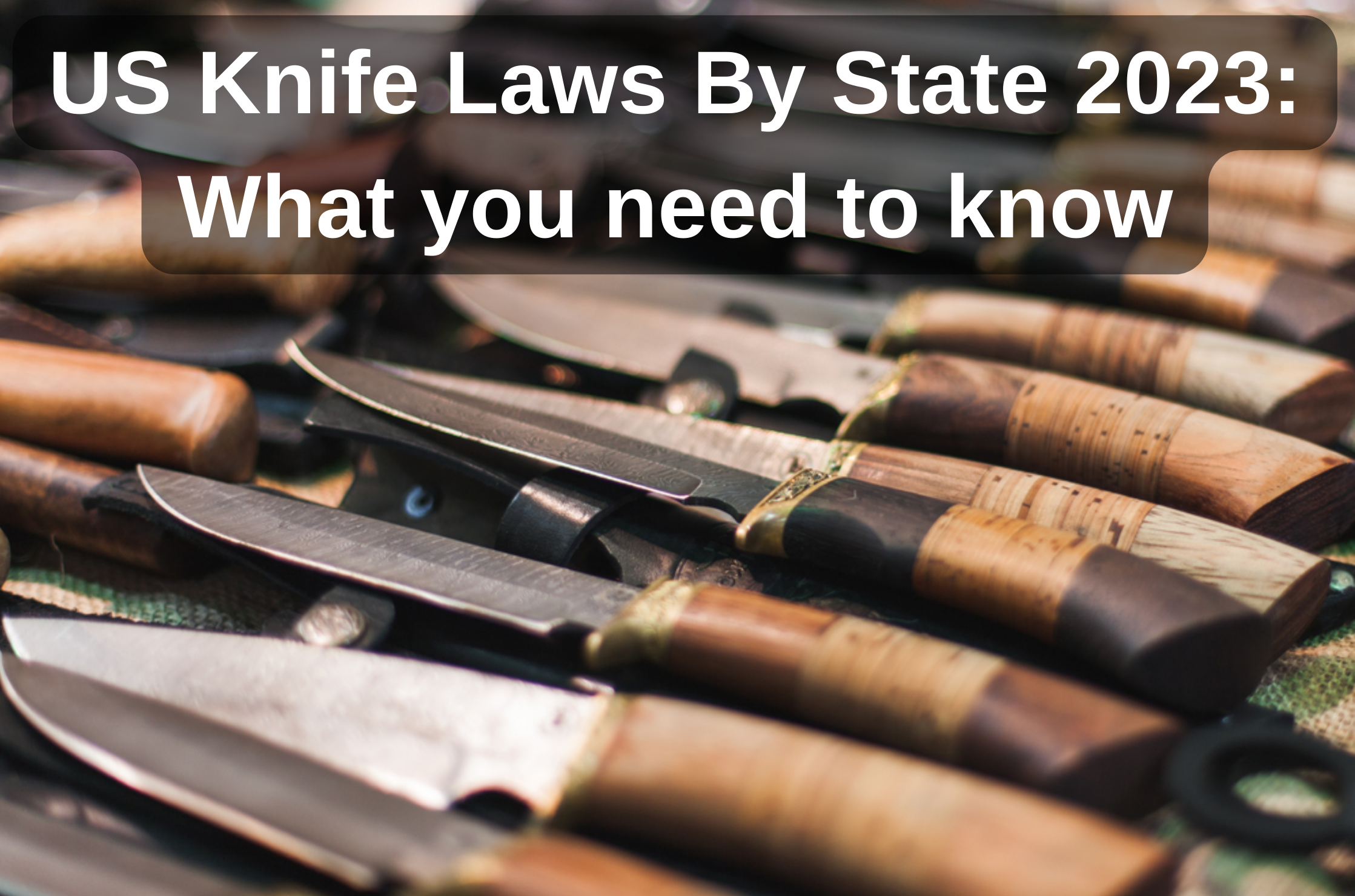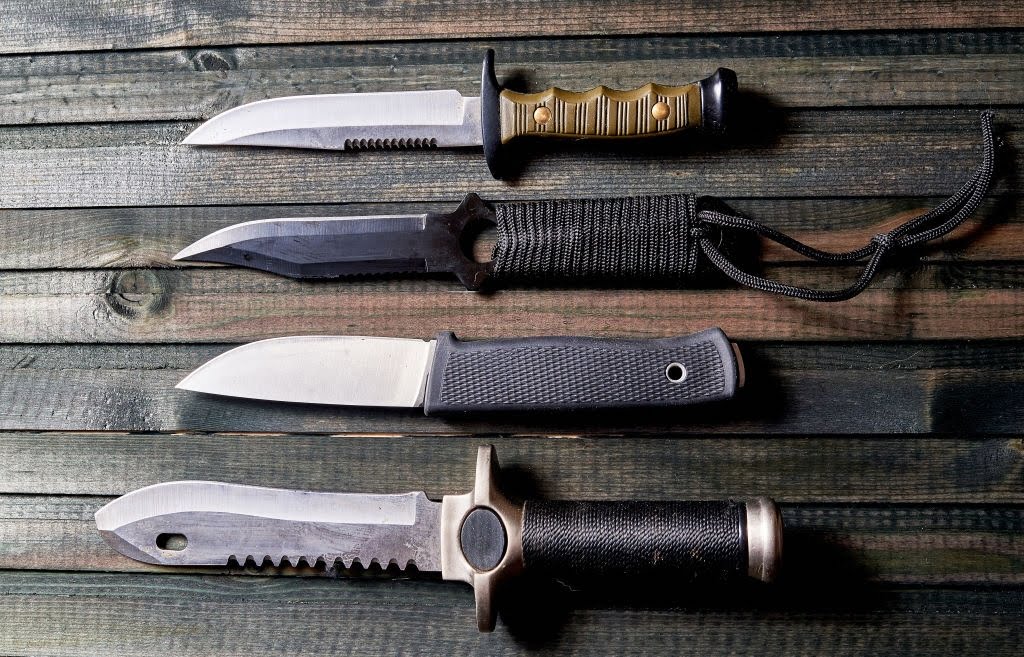
Knives are essential tools that have been used for various purposes since ancient times. In the United States, knives are prevalent and have become an important part of daily life. However, the use and possession of knives are regulated by the law. The us knife laws vary from state to state, making it essential to understand the rules and regulations regarding knives in your state. This article will provide you with an overview of the US knife laws by state 2023.
It’s important to note that this article is for informational purposes only and there may be additional restrictions or laws regarding knives are subject to change. It’s advisable to review the official states statutes or consult legal counsel for the most accurate and up-to-date information regarding specific legal and illegal knives
Overview of US Knife Laws

The US knife laws are diverse and vary from state to state. Some states allow people to carry knives without any restrictions, while others have strict laws on the possession and use of knives. Understanding the knife laws in your state is important, as violating these laws can result in severe penalties, including fines and imprisonment.
The US knife laws are categorized into three broad categories: prohibited knives, restricted knives, and unrestricted knives. Prohibited knives are knives that are illegal to own, sell, or possess in any form. Restricted knives are knives that have limitations on their ownership, possession, or use. Unrestricted knives are knives that do not have any legal limitations on their ownership, possession, or use.
In this article we will talking about Knife Laws By State, lets see general information about legal and illegal knives in the USA States
Note: If you want to check more detailed information about states law, you can click on the name of state and will be redirected to the proper page, however, we still working on the articles, so we don’t have all necessary information for all states:
| State | Carrying of knives* | Legal knives | Illegal knives |
|---|---|---|---|
| Alabama (AL) | Regulated by state law | Pocket Knives, Hunting Knives, Utility Knives | Ballistic Knives, Gravity Knives, Switchblades, Other Prohibited Knives |
| Alaska (AK) | Generally permissive | Folding Knives, Hunting Knives, Utility Knives, etc | Switchblades, Ballistic Knives, Knives Used for Criminal Intent |
| Arizona (AZ) | Generally permissive | Folding Knives, Hunting Knives, Utility Knives, etc | Automatic Knives, Ballistic Knives, Knives Used for Criminal Intent |
| Arkansas (AR) | Generally permissive | Folding Knives, Hunting Knives, Utility Knives, etc | Switchblades, Ballistic Knives, Knives Used for Criminal Intent |
| California (CA) | Relatively strict | Folding Knives, Utility Knives, Traditional Pocket Knives | Switchblades, Balisong (Butterfly) Knives, Disguised Knives |
| Colorado (CO) | Relatively permissive | Folding Knives, Hunting Knives, Utility Knives | Illegal Weapon Modifications, Knives Used for Criminal Intent |
| Connecticut (CT) | Relatively restrictive | Folding Knives, Hunting Knives | Switchblades, Balisong (Butterfly) Knives |
| Delaware (DE) | Generally permissive | Folding Knives, Hunting Knives, Utility Knives, etc | Offensive Weapons, Knives Used for Criminal Intent |
| Florida (FL) | Generally permissive | Folding Knives, Hunting Knives, Automatic Knives | Ballistic Knives, Knives Used for Criminal Intent |
| Georgia (GA) | Generally permissive | Folding Knives, Hunting Knives, Automatic Knives, etc | Knives Used for Criminal Intent |
| Hawaii (HI) | Relatively strict | Folding Knives, Utility Knives | Automatic Knives, Balisong (Butterfly) Knives, Gravity Knives |
| Idaho (ID) | Generally permissive | Folding Knives, Hunting Knives, Automatic Knives, etc | Knives Used for Criminal Intent |
| Illinois (IL) | Relatively strict | Folding Knives, Hunting Knives | Switchblades, Ballistic Knives, Knives Used for Criminal Intent |
| Indiana (IN) | Generally permissive | Folding Knives, Hunting Knives, Automatic Knives, etc | Knives Used for Criminal Intent |
| Iowa (IA) | Generally permissive | Folding Knives, Hunting Knives, Automatic Knives, etc | Knives Used for Criminal Intent |
| Kansas (KS) | Generally permissive | Folding Knives, Hunting Knives, Automatic Knives, etc | Knives Used for Criminal Intent |
| Kentucky (KY) | Relatively permissive | Folding Knives, Hunting Knives, Automatic Knives | Knives Used for Criminal Intent |
| Louisiana (LA) | Generally permissive | Folding Knives, Hunting Knives, Automatic Knives | Knives Used for Criminal Intent |
| Maine (ME) | Relatively permissive | Folding Knives, Hunting Knives, Automatic Knives | Knives Used for Criminal Intent |
| Maryland (MD) | Relatively strict | Folding Knives, Hunting Knives, Utility Knives | Dagger and Bowie Knives, Switchblades |
| Massachusetts (MA) | Relatively strict | Folding Knives, Hunting Knives | Switchblades, Dirks, Daggers, and Stilettos |
| Michigan (MI) | Relatively permissive | Folding Knives, Hunting Knives, Automatic Knives | Knives Used for Criminal Intent |
| Minnesota (MN) | Relatively permissive | Folding Knives, Hunting Knives, Automatic Knives | Knives Used for Criminal Intent |
| Mississippi (MS) | Relatively permissive | Folding Knives, Hunting Knives | Bowie Knives, Knives Used for Criminal Intent |
| Missouri (MO) | Relatively permissive | Folding Knives, Hunting Knives | Switchblades, Knives Used for Criminal Intent |
| Montana (MT) | Generally permissive | Folding Knives, Hunting Knives, Automatic Knives | Knives Used for Criminal Intent |
| Nebraska (NE) | Relatively permissive | Folding Knives, Pocket Knives, Hunting Knives, etc | Switchblades, Ballistic knives, Gravity knives |
| Nevada (NV) | Generally permissive | Folding Knives, Pocket Knives, Hunting Knives, etc | Switchblades, Ballistic knives, Gravity knives |
| New Hampshire (NH) | Generally permissive | Folding Knives, Hunting knives, Utility knives | Switchblades, Balisong/butterfly knives, Gravity knives |
| New Jersey (NJ) | Quite complex and strict | Folding knives, Fixed-blade knives, Utility knives | Gravity knives, Switchblades, Balisong/butterfly knives, Dirk, dagger, or stiletto |
| New Mexico (NM) | Relatively permissive | Folding Knives, Hunting knives, Utility knives | Switchblades, Knives used for unlawful purposes, Carrying knives in restricted areas |
| New York (NY) | Quite complex and strict | Folding Knives, Hunting knives | Switchblades, Gravity knives, Dagger or dirk |
| North Carolina (NC) | Relatively permissive | Folding knives, Fixed-blade knives, Utility knives | Switchblades, Balisong knives, Disguised knives |
| North Dakota (ND) | Relatively permissive | Folding knives, Fixed-blade knives, Utility knives | Knives Used for Criminal Intent |
| Ohio (OH) | Generally permissive | Folding Knives, Pocket knives, Hunting and Utility knives | Switchblades, Balisong knives, Gravity knives |
| Oklahoma (OK) | Relatively permissive | Folding knives, Fixed-blade knives, Automatic knives | Bowie knives, Balisong knives, Dirk knives |
| Oregon (OR) | Relatively permissive | Folding knives, Pocket knives, Fixed-blade knives, Multi-tools | Switchblade knives, Ballistic knives, Gravity knives |
| Pennsylvania (PA) | Generally permissive | Folding knives, Fixed-blade knives, Pocket knives | Automatic knives, Ballistic knives, Gravity knives |
| Rhode Island (RI) | Generally permissive | Folding knives, Pocket knives, Utility knives | Switchblades, Gravity knives, Ballistic knives |
| South Carolina (SC) | Relatively permissive | Folding knives, Pocket knives, Hunting and Utility knives | Switchblades, Ballistic knives, Dagger knives |
| South Dakota (SD) | Relatively permissive | Folding knives, Pocket knives, Hunting and Utility knives | Switchblades, Gravity knives, Ballistic knives |
| Tennessee (TN) | Generally permissive | Hunting knives, Pocket knives, Utility knives | Switchblades, Gravity knives, knives with blades over 4 inches in length with the intent to go armed. |
| Texas (TX) | Generally permissive | Folding knives, Pocket knives, Hunting and Utility knives | Switchblades, Gravity knives, knives with blades over 5.5 inches in length |
| Utah (UT) | Relatively permissive | Folding knives, Pocket knives, Hunting and Utility knives | Switchblades, Ballistic knives, knives with blades over 3.5 inches in length in certain public places |
| Vermont (VT) | Relatively permissive | Folding knives, Pocket knives, Hunting and Utility knives | Switchblades, Gravity knives, Automatic knives (blade length exceeding 3 inches) |
| Virginia (VA) | Relatively permissive | Folding knives, Pocket knives, Hunting and Utility knives | Switchblades, Ballistic knives, Automatic knives (blade length exceeding 3 inches) |
| Washington (WA) | Generally permissive | Folding knives, Pocket knives, Hunting and Utility knives | Spring-assisted knives, Switchblades, Automatic knives (blade length exceeding 3.5 inches) |
| West Virginia (WV) | Relatively permissive | Folding knives, Pocket knives, Hunting and Utility knives | Ballistic knives, Other knives with a detachable blade propelled by a spring mechanism. |
| Wisconsin (WI) | Relatively permissive | Folding knives, Pocket knives, Hunting and Utility knives | Switchblades, Automatic knives (blade length exceeding 3 inches) |
| Wyoming (WY) | Relatively permissive | Folding knives, Pocket knives, Hunting and Utility knives | Ballistic knives, Knives with a blade length exceeding 3.5 inches |
State Laws on Knives
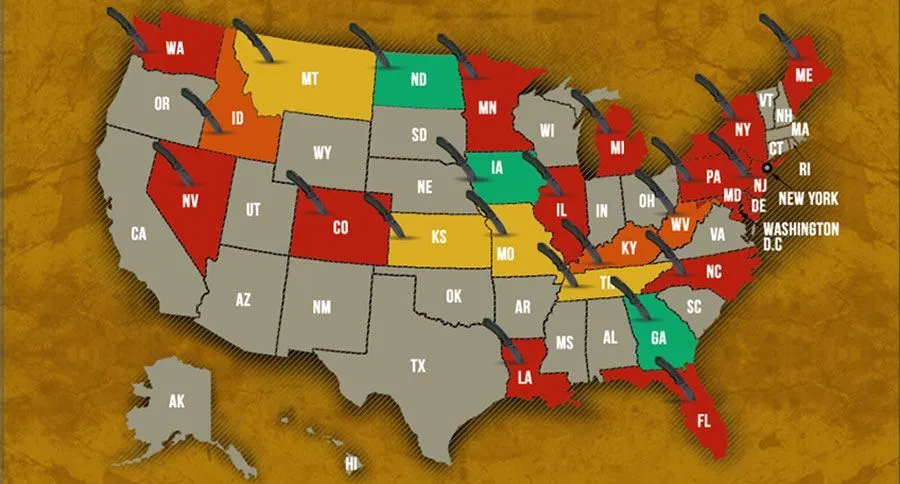
Alabama (AL)
Knife laws in Alabama are relatively relaxed compared to some other states. It is legal to carry most types of knives openly, including folding knives and fixed-blade knives. However, it is important to note that the possession and carry of certain types of knives, such as switchblades, gravity knives, and knives with a blade longer than 12 inches, may be restricted. It is also prohibited to carry a knife with the intent to harm another person or use it in a threatening manner. It is advisable to familiarize yourself with the specific laws and regulations regarding Alabama knife laws to ensure compliance.
Alaska (AK)
Alaska knife laws are generally permissive, allowing for the ownership and carrying of various types of knives. There are no statewide restrictions on blade length for folding knives or fixed-blade knives. Knives are generally considered tools rather than weapons, and they are legal to possess and carry openly or concealed. However, it’s important to note that local regulations or restrictions may exist in certain areas or specific situations. It is advisable to review the official Alaska state statutes or consult legal counsel for the most accurate and up-to-date information regarding knife laws in Alaska.
Arizona (AZ)
In Arizona, knife laws are relatively permissive. There are no specific blade length restrictions for folding knives, making them legal to carry. Automatic knives, including switchblades, are also legal to own and carry openly. However, it’s important to note that certain locations such as schools and government buildings may have restrictions on carrying knives. It is advisable to review the official Arizona state statutes or consult legal counsel for the most accurate and up-to-date information regarding knife laws in Arizona.
Arkansas (AR)
In Arkansas, knife laws are generally permissive, allowing for the ownership and carrying of various types of knives. There are no specific restrictions on blade length for folding or fixed-blade knives, making them legal to possess and carry. However, it is important to be aware of any local regulations or restrictions that may exist in certain areas or specific situations. It is advisable to review the official Arkansas state statutes or consult legal counsel for the most accurate and up-to-date information regarding knife laws in Arkansas.
California (CA)
In California, knife laws are relatively strict and can be complex. Folding knives with blades under 2 inches are generally legal to carry, while switchblades, automatic knives, and balisong (butterfly) knives are typically illegal to possess or carry. Additionally, certain cities and counties in California may have further restrictions on blade lengths, locking mechanisms, and concealed carry. It is important to review the official California state statutes or consult legal counsel for the most accurate and up-to-date information regarding knife laws in California.
Colorado (CO)
In Colorado, knife laws are generally permissive. There are no statewide restrictions on blade length for folding or fixed-blade knives, making them legal to possess and carry. Automatic knives, including switchblades, are also legal to own and carry openly in Colorado. However, it’s important to note that local regulations or restrictions may exist in certain areas or specific situations. It is advisable to review the official Colorado state statutes or consult legal counsel for the most accurate and up-to-date information regarding knife laws in Colorado.
Connecticut (CT)
In Connecticut, knife laws are relatively restrictive compared to some other states. It is illegal to possess or carry switchblades, also known as automatic knives, regardless of blade length. Balisong knives, commonly referred to as butterfly knives, are also prohibited in Connecticut. It is important to review the official Connecticut state statutes or consult legal counsel for the most accurate and up-to-date information regarding knife laws in Connecticut, as there may be additional local regulations or restrictions.
Delaware (DE)
In Delaware, knife laws are generally permissive. There are no specific restrictions on blade length for folding or fixed-blade knives, making them legal to possess and carry. However, it is important to note that using any knife for criminal purposes or in the commission of a crime is illegal, regardless of its type or design. It is advisable to review the official Delaware state statutes or consult legal counsel for the most accurate and up-to-date information regarding knife laws in Delaware, as local regulations may exist in certain areas.
Florida (FL)
In Florida, knife laws are relatively permissive. There are no specific restrictions on blade length for folding or fixed-blade knives, making them generally legal to possess and carry. Automatic knives, including switchblades, are also legal to own and carry openly in Florida. However, it is important to note that local regulations or restrictions may exist in certain areas or specific situations. It is advisable to review the official Florida state statutes or consult legal counsel for the most accurate and up-to-date information regarding knife laws in Florida.
Georgia (GA)
In Georgia, knife laws are relatively permissive. There are no specific restrictions on blade length for folding or fixed-blade knives, making them legal to possess and carry. Automatic knives, including switchblades, are also legal to own and carry openly in Georgia. However, it’s important to note that local regulations or restrictions may exist in certain areas or specific situations. It is advisable to review the official Georgia state statutes or consult legal counsel for the most accurate and up-to-date information regarding knife laws in Georgia.
Hawaii (HI)
In Hawaii, knife laws are relatively strict. Automatic knives, including switchblades, are generally illegal to possess or carry. Balisong knives, also known as butterfly knives, are typically prohibited as well. Additionally, Hawaii has restrictions on blade length for folding knives, with a limit of 3 inches or less for legal carry. It is important to review the official Hawaii state statutes or consult legal counsel for the most accurate and up-to-date information regarding knife laws in Hawaii, as there may be additional local regulations or restrictions.
Idaho (ID)
In Idaho, knife laws are generally permissive. There are no specific restrictions on blade length for folding or fixed-blade knives, making them legal to possess and carry. Automatic knives, including switchblades, are also legal to own and carry openly in Idaho. It is important to note that local regulations or restrictions may exist in certain areas or specific situations. It is advisable to review the official Idaho state statutes or consult legal counsel for the most accurate and up-to-date information regarding knife laws in Idaho.
Illinois (IL)
In Illinois, knife laws are relatively strict. The possession and carrying of certain types of knives, such as switchblades and ballistic knives, are generally prohibited. However, folding knives with blades that are 2.5 inches or less in length are typically allowed for everyday carry. It is important to review the official Illinois state statutes or consult legal counsel for the most accurate and up-to-date information regarding knife laws in Illinois, as there may be additional local regulations or restrictions.
Indiana (IN)
In Indiana, knife laws are relatively permissive. There are no specific restrictions on blade length for folding or fixed-blade knives, making them legal to possess and carry. Automatic knives, including switchblades, are also legal to own and carry openly in Indiana. It is important to note that local regulations or restrictions may exist in certain areas or specific situations, so it is advisable to review the official Indiana state statutes or consult legal counsel for the most accurate and up-to-date information regarding knife laws in Indiana.
Iowa (IA)
In Iowa, knife laws are generally permissive. Folding knives, including pocket knives, are legal to possess and carry, and there are no specific restrictions on blade length. However, it’s important to be aware of local regulations or restrictions that may exist within specific cities or areas in Iowa.
Kansas (KS)
In Kansas, knife laws are generally permissive. There are no specific restrictions on blade length for folding or fixed-blade knives, making them legal to possess and carry.
Kentucky (KY)
In Kentucky, knife laws are generally permissive, allowing for the possession and carry of various types of knives. Folding knives, including pocket knives, are legal to possess and carry without any specific restrictions on blade length. This means individuals have the flexibility to choose the size and style of folding knife that suits their needs. It’s important to note that while Kentucky has permissive knife laws, local regulations or restrictions may exist in certain cities or areas, so it’s advisable to review the official Kentucky state statutes or consult legal counsel for the most accurate and up-to-date information regarding knife laws in Kentucky.
Louisiana (LA)
In Louisiana, knife laws are generally permissive. Folding knives, including pocket knives, are legal to possess and carry, and there are no specific restrictions on blade length.
Maine (ME)
In Maine, knife laws are relatively permissive. Folding knives, including pocket knives, are generally legal to possess and carry without any specific restrictions on blade length. However, it is important to note that while the state has permissive knife laws, local regulations or restrictions may exist in certain cities or areas within Maine, so it is advisable to review the official Maine state statutes or consult legal counsel for the most accurate and up-to-date information regarding knife laws in Maine.
Maryland (MD)
In Maryland, knife laws are relatively strict compared to some other states. Switchblades and certain types of knives like dirks, daggers, and stilettos are generally prohibited and illegal to possess or carry. However, folding knives, including pocket knives, are typically legal to possess and carry, provided they are not concealed and do not have automatic opening mechanisms. It’s important to note that there may be additional local regulations or restrictions within Maryland, so it is advisable to review the official Maryland state statutes or consult legal counsel for the most accurate and up-to-date information regarding knife laws in Maryland.
Massachusetts (MA)
In Massachusetts, knife laws are relatively strict compared to some other states. Automatic knives, commonly known as switchblades, are generally illegal to possess or carry. However, folding knives, including pocket knives, are generally legal to possess and carry as long as they are not concealed and do not have automatic opening mechanisms. It’s important to note that there may be additional local regulations or restrictions within Massachusetts, so it is advisable to review the official Massachusetts state statutes or consult legal counsel for the most accurate and up-to-date information regarding knife laws in Massachusetts.
Michigan (MI)
In Michigan, knife laws are relatively permissive. Folding knives, including pocket knives, are generally legal to possess and carry. Automatic knives, commonly known as switchblades, are legal to own and carry openly in Michigan. However, it’s important to note that while Michigan has permissive knife laws, it is illegal to use any knife for criminal purposes or in the commission of a crime. It is advisable to review the official Michigan state statutes or consult legal counsel for the most accurate and up-to-date information regarding knife laws in Michigan.
Minnesota (MN)
In Minnesota, knife laws are relatively permissive. Folding knives, including pocket knives, are generally legal to possess and carry. However, it is illegal to use any knife for criminal purposes or in the commission of a crime.
Mississippi (MS)
In Mississippi, knife laws are relatively permissive. Folding knives, including pocket knives, are generally legal to possess and carry. There are no specific statewide restrictions on blade length, but it’s important to note that local regulations or restrictions may exist in certain cities or areas within Mississippi, so it is advisable to review the official Mississippi state statutes or consult legal counsel for the most accurate and up-to-date information regarding knife laws in Mississippi.
Missouri (MO)
In Missouri, knife laws are relatively permissive. Folding knives, including pocket knives, are generally legal to possess and carry. There are no specific statewide restrictions on blade length, but it’s important to note that local regulations or restrictions may exist in certain cities or areas within Missouri, so it is advisable to review the official Missouri state statutes or consult legal counsel for the most accurate and up-to-date information regarding knife laws in Missouri.
Montana (MT)
In Montana, knife laws are generally permissive. Folding knives, including pocket knives, are generally legal to possess and carry without any specific restrictions on blade length. However, it’s important to note that while Montana has permissive knife laws, local regulations or restrictions may exist in certain cities or areas within Montana, so it is advisable to review the official Montana state statutes or consult legal counsel for the most accurate and up-to-date information regarding knife laws in Montana.
Nebraska (NE)
In Nebraska, the knife laws are generally permissive, allowing for the possession and carrying of folding knives, pocket knives, and other non-automatic knives. There are no specific restrictions on blade length for legal knives in Nebraska. However, knives considered illegal in the state include switchblades, gravity knives, and knives with an automatic opening mechanism. It is important to review the official Nebraska state statutes or consult legal counsel for precise information on knife laws and to ensure compliance with any local regulations that may exist.
Nevada (NV)
In Nevada, it is legal to possess and carry various types of knives, including folding knives, pocket knives, and fixed-blade knives. There are no specific restrictions on blade length or knife types, making Nevada relatively permissive when it comes to knife laws.
New Hampshire (NH)
In New Hampshire, the laws regarding knives are generally lenient. There are no specific restrictions on the types of knives that are legal to possess or carry, including folding knives, pocket knives, and fixed-blade knives. However, it’s important to note that certain places may have their own regulations on carrying knives, such as schools, government buildings, or public events, so it’s important to be aware of any local ordinances or specific rules in those situations.
New Jersey (NJ)
In New Jersey, the knife laws are quite strict and specific. The possession and carry of certain types of knives are heavily regulated. Switchblade knives and gravity knives, which can be opened by gravity or a flick of the wrist, are generally illegal to possess or carry, unless it is for specific occupational purposes such as law enforcement or rescue personnel. Additionally, ballistic knives, which have a spring-loaded blade, are also prohibited. It’s important to note that even some common folding knives may be considered illegal if they can be opened with one hand, as New Jersey has restrictions on one-handed opening knives. It’s advisable to review the official New Jersey state statutes or consult legal counsel for the most accurate and up-to-date information regarding knife laws in the state, as there may be additional regulations or exceptions.
New Mexico (NM)
In New Mexico, the knife laws are relatively permissive. There are no statewide restrictions on the types of knives that are legal to possess or carry, including folding knives, pocket knives, and fixed-blade knives. However, it’s important to note that individual cities or counties within New Mexico may have their own knife regulations, so it’s advisable to be aware of any local ordinances or specific rules that may apply.
New York (NY)
In New York, the knife laws are quite complex and restrictive. It is illegal to possess or carry certain types of knives, including switchblades, gravity knives, and balisong knives (butterfly knives). Additionally, any knife that can be opened with a flick of the wrist or a press of a button is considered illegal. New York City has particularly stringent knife laws, including restrictions on the length of the blade for folding knives. It’s crucial to familiarize yourself with the specific regulations in your jurisdiction and consult legal counsel or review the official New York state statutes for the most accurate and up-to-date information regarding knife laws in the state.
North Carolina (NC)
In North Carolina, the knife laws are relatively lenient. There are no statewide restrictions on the types of knives that are legal to possess or carry, including folding knives, pocket knives, and fixed-blade knives. However, it’s important to note that individual cities or counties within North Carolina may have their own knife regulations, so it’s advisable to be aware of any local ordinances or specific rules that may apply.
North Dakota (ND)
In North Dakota, there are no specific restrictions on the types of knives that are illegal to possess or carry. The state generally allows for the possession and carry of a wide range of knives, including folding knives, fixed-blade knives, and utility knives. However, it’s important to be aware that using a knife with the intent to commit a crime or brandishing a knife in a threatening manner can still be illegal.
Ohio (OH)
In Ohio, the knife laws are relatively permissive. It is legal to possess and carry various types of knives, including folding knives, pocket knives, and fixed-blade knives. There are no specific restrictions on blade length or knife types, making Ohio relatively lenient when it comes to knife laws.
Oklahoma (OK)
In Oklahoma, knife laws are generally permissive. There are no restrictions on the types of knives that are legal to possess or carry, including folding knives, pocket knives, and fixed-blade knives. However, it’s important to note that certain places, such as schools or government buildings, may have their own regulations on carrying knives, so it’s advisable to be aware of any local ordinances or specific rules in those situations.
Oregon (OR)
In Oregon, knife laws are relatively permissive. It is legal to possess and carry various types of knives, including folding knives, pocket knives, and fixed-blade knives. There are no specific restrictions on blade length or knife types, making Oregon a state with fewer knife-related regulations. However, it’s important to note that certain places, such as schools, government buildings, or private properties, may have their own regulations on carrying knives, so it’s advisable to be aware of any local ordinances or specific rules in those locations.
Pennsylvania (PA)
In Pennsylvania, most types of knives are legal to possess and carry. There are no specific restrictions on blade length or knife types, making it a state with relatively lenient knife laws.
Rhode Island (RI)
In Rhode Island, the possession and carrying of most types of knives are legal. However, there are restrictions on certain types of knives, including switchblades, ballistic knives, and gravity knives, which are generally prohibited. It’s important to note that the definition of a switchblade in Rhode Island includes any knife with a blade that opens automatically by pressure applied to a button, spring, or other mechanism. Additionally, it’s advisable to familiarize yourself with local regulations and specific locations where knives may be restricted, such as schools or government buildings.
South Carolina (SC)
In South Carolina, the possession and carrying of most types of knives are legal. There are no specific restrictions on blade length or knife types, making it a state with relatively lenient knife laws. However, it’s important to note that carrying a knife with a blade longer than 2 inches in certain places, such as schools and government buildings, may have restrictions on carrying knives, and it is prohibited to carry a knife with the intent to commit a crime.
South Dakota (SD)
In South Dakota, the possession and carrying of most types of knives are legal. There are no specific restrictions on blade length or knife types, making it a state with relatively lenient knife laws. However, it’s important to note that carrying a knife with the intent to harm others or for unlawful purposes is prohibited.
Tennessee (TN)
In Tennessee, the possession and carrying of most types of knives are legal. There are no specific restrictions on blade length or knife types, making it a state with relatively lenient knife laws. However, it’s important to note that carrying a knife with the intent to harm others or for unlawful purposes is prohibited.
Texas (TX)
In Texas, the possession and carrying of most types of knives are legal. There are no specific restrictions on blade length or knife types, making it a state with relatively lenient knife laws. However, it’s important to note that carrying a knife with the intent to harm others or for unlawful purposes is prohibited. It is advisable to exercise caution and be aware of any local regulations or restrictions, as certain areas or establishments may have their own rules regarding carrying knives.
Utah (UT)
In Utah, the possession and carrying of most types of knives are legal. Common folding knives, pocket knives, hunting knives, and utility knives are generally considered legal. However, it is illegal to possess or carry switchblades or automatic knives with a blade longer than 3 inches without a valid permit.
Vermont (VT)
In Vermont, there are no specific laws that prohibit the possession or carrying of knives. Generally, common folding knives, pocket knives, hunting knives, and utility knives are considered legal. However, it’s important to exercise caution and adhere to other applicable laws and regulations when carrying a knife.
Virginia (VA)
In Virginia, the possession and carrying of most types of knives are legal. Common folding knives, pocket knives, hunting knives, and utility knives are generally considered legal. However, it is illegal to possess or carry ballistic knives or switchblades with a blade longer than 3 inches without a valid permit. It’s advisable to familiarize yourself with the specific knife laws in each state and any local regulations to ensure compliance.
Washington (WA)
In Washington, the possession and carrying of most types of knives are legal. Common folding knives, pocket knives, hunting knives, and utility knives are generally considered legal. However, it is illegal to possess or carry automatic knives, also known as switchblades, with a blade longer than 3.5 inches without a valid permit.
West Virginia (WV)
In West Virginia, the possession and carrying of most types of knives are legal. Common folding knives, pocket knives, hunting knives, and utility knives are generally considered legal. However, it is illegal to possess or carry Bowie knives, dirks, or other similar knives with the intent to unlawfully harm another person.
Wisconsin (WI)
In Wisconsin, the possession and carrying of most types of knives are legal. Common folding knives, pocket knives, hunting knives, and utility knives are generally considered legal. However, it is illegal to possess or carry switchblades or automatic knives, including those with a blade longer than 3 inches, without a valid permit.
Wyoming (WY)
In Wyoming, the possession and carrying of most types of knives are legal. Common folding knives, pocket knives, hunting knives, and utility knives are generally considered legal. There are no specific blade length restrictions for knives in Wyoming, but it’s important to exercise caution and adhere to other applicable laws and regulations when carrying a knife.
Types of Knives
Well, there were different types of knives in our list. Let’s take a look at some of them to better understand what our knives look like:
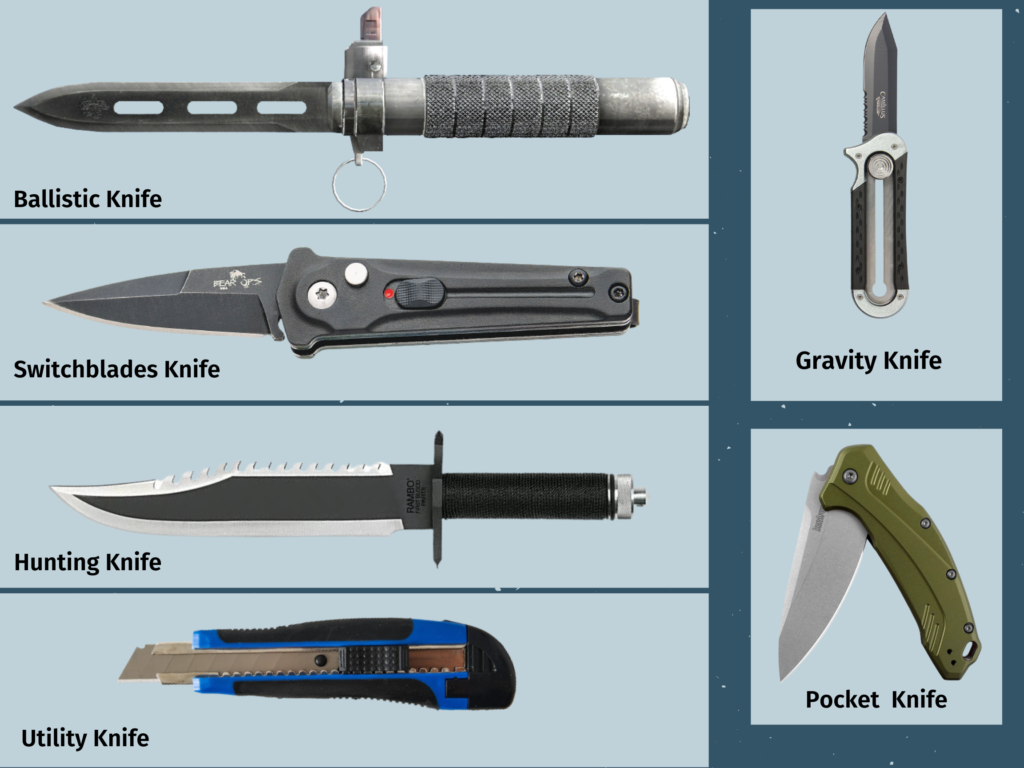
- Ballistic Knife
Ballistic knives are unique because they feature a spring-loaded mechanism that propels the blade forward with significant force. This makes them capable of long-range deployment and is generally considered illegal in many jurisdictions due to their potential danger. - Gravity Knife
Gravity knives are designed to open with the assistance of gravity. They typically have a blade that is released when the knife is flicked or swung open, using the force of gravity. The legality of gravity knives varies by jurisdiction, and in some places, they may be considered illegal to possess or carry. - Switchblades
Switchblades, also known as automatic knives, are equipped with a spring-loaded mechanism that deploys the blade with a push of a button or switch. The blade quickly extends and locks into place. The legality of switchblades varies by jurisdiction, and in many places, they are regulated or outright prohibited. - Pocket Knife
Pocket knives are versatile folding knives that can be conveniently carried in a pocket or clipped to a belt. They come in various shapes and sizes, and their blades can be manually opened using a thumb stud, nail nick, or flipper mechanism. Pocket knives are generally legal to possess and carry in most places, but blade length restrictions may apply in some jurisdictions. - Hunting Knife
Hunting knives are specifically designed for hunting and outdoor activities. They typically have a fixed blade, a sturdy construction, and a sharp edge. Hunting knives are generally legal to possess and carry, as they serve practical purposes in outdoor pursuits such as field dressing game. - Utility Knife
Utility knives are multipurpose tools that are widely used for everyday tasks. They feature a retractable or replaceable blade and are commonly used in various industries such as construction, crafts, and general household use. Utility knives are generally legal to possess and carry, as they are considered essential tools for practical purposes.
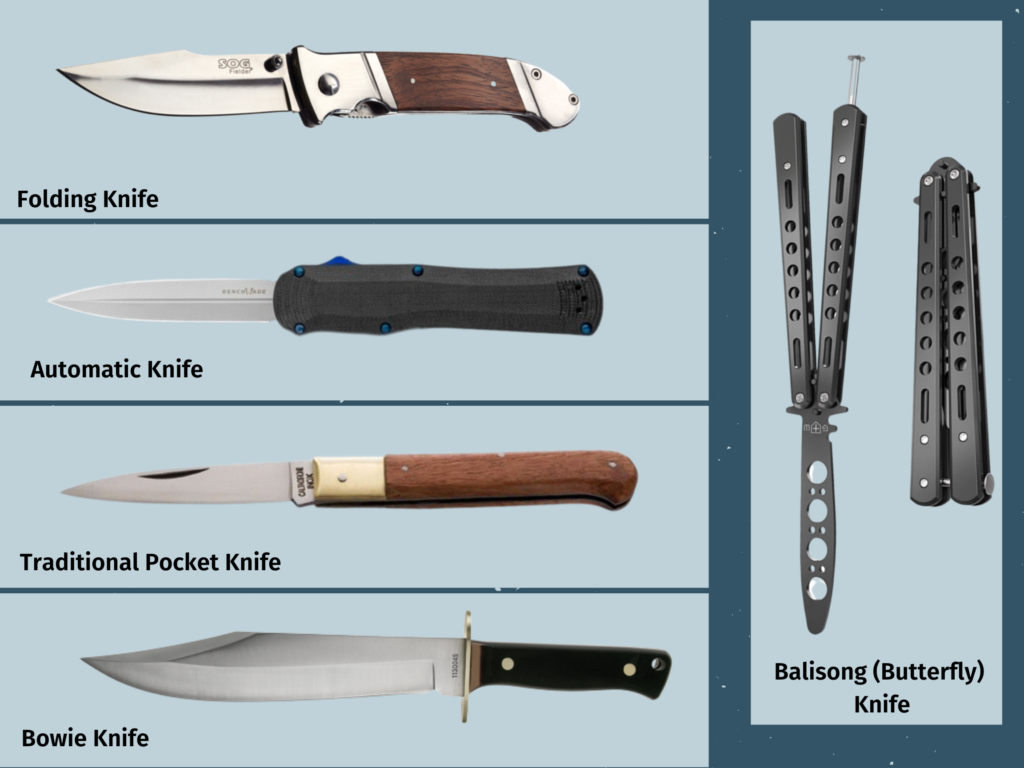
- Folding Knife
A folding knife, also known as a pocket knife, has a blade that folds into the handle when not in use. It typically features a pivot mechanism that allows for easy opening and closing of the blade. Folding knives come in various designs, sizes, and locking mechanisms, offering versatility and portability. - Automatic Knife
An automatic knife, also referred to as a switchblade, is a type of knife with a blade that deploys automatically with the press of a button or switch. The blade quickly extends and locks into place. Automatic knives are subject to specific laws and regulations in many jurisdictions due to their automatic opening mechanism. - Balisong (Butterfly) Knife
A Balisong, commonly known as a butterfly knife, is a folding knife with two handles that rotate around the blade pivot. The unique design allows for flipping and manipulation of the knife. Balisong knives may have legal restrictions in some places due to their potential for misuse and safety concerns. - Traditional Pocket Knife
A traditional pocket knife refers to a classic folding knife design that has been used for generations. It often features one or more blades, such as a clip point, spear point, or pen blade. These knives usually have a slip joint mechanism to keep the blade securely open or closed. Traditional pocket knives are commonly used for everyday tasks and have a timeless appeal. - Bowie Knife
The Bowie knife is a fixed-blade knife with a long, wide, and clip-pointed blade. It is named after American folk hero Jim Bowie and is known for its versatility in outdoor and survival applications. Bowie knives often have a crossguard and a substantial handle for a secure grip. They are popular among outdoor enthusiasts, hunters, and collectors.
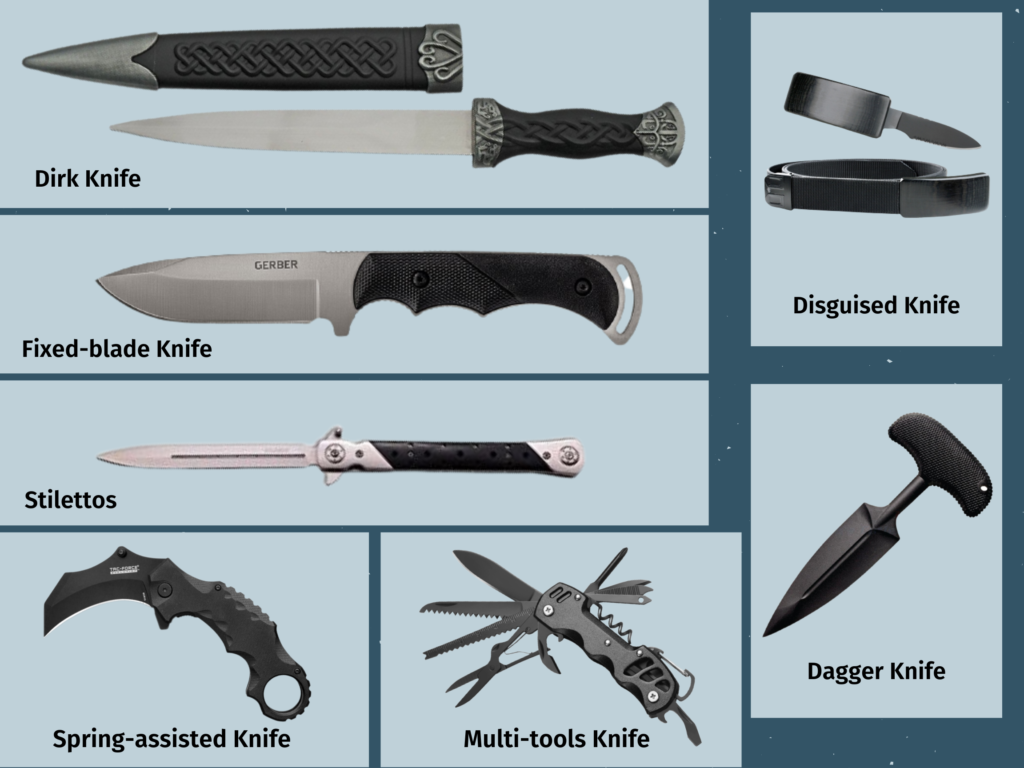
- Dirk Knife
A dirk knife is a long-bladed, double-edged knife with a straight or slightly curved blade. It typically features a hilt or guard to protect the user’s hand during thrusting or slashing motions. Dirk knives have historical significance and were traditionally used as weapons in certain regions. - Fixed-blade Knife
A fixed-blade knife is a type of knife that has a blade that extends directly from the handle and does not fold or retract. It offers a strong and sturdy construction, making it suitable for heavy-duty tasks, outdoor activities, and survival situations. Fixed-blade knives are available in various sizes and designs, catering to different purposes. - Dagger Knife
A dagger knife is a double-edged knife with a sharp, symmetrical blade and a pointed tip. It is primarily designed for thrusting and stabbing rather than slicing or cutting. Dagger knives have a rich historical background and have been used as weapons, ceremonial tools, or collectibles. - Disguised Knife
A disguised knife refers to a knife that is designed to look like an innocuous or everyday item, such as a pen, keychain, or belt buckle. These knives are intended for self-defense purposes and are often small and easily concealable. However, the legality and restrictions regarding disguised knives vary depending on local laws. - Stilettos
Stilettos are narrow-bladed knives with a long, slender profile and a sharp point. They are typically designed for piercing and stabbing. Stilettos have a distinctive appearance and have been popularized in various cultures, including as part of traditional Italian knife craftsmanship. - Spring-assisted Knife
A spring-assisted knife is a type of folding knife that incorporates a spring mechanism to facilitate easier and quicker opening of the blade. Unlike automatic knives, spring-assisted knives require manual activation, usually through a thumb stud or flipper. These knives provide a balance between convenience and legality, as they often have fewer legal restrictions compared to automatic knives. - Multi-tools
A multi-tools knife is a versatile tool that combines a knife blade with other tools such as pliers, screwdrivers, saws, and more, all in a compact and foldable design. These knives are popular among outdoor enthusiasts, campers, and individuals who require a range of tools in a single package.
Conclusion

In summary, knife laws vary from state to state and it is important to understand the specific laws and regulations that apply to your state. While some states allow the possession and carrying of any type of knife, including interchangeable blades, other states place restrictions on the length, type, and carrying of knives. It is very important to know and follow local laws and regulations to avoid legal problems related to owning and carrying a knife.
If you are unsure about the knife laws in your state, it is recommended to consult the state and local laws or contact a legal professional for guidance. By being informed and understanding the knife laws in your state, you can enjoy the use of knives for personal or professional purposes while staying compliant with the law.
FaQ
Can I legally carry a switchblade knife in Alaska?
Yes, in Alaska it is legal to own and carry any type of knife, including switchblades. However, it is illegal to carry a deadly weapon with the intent to use it unlawfully.
Are there any restrictions on carrying knives in Arizona?
In Arizona, it is generally legal to own and carry any type of knife, including switchblades. However, it is illegal to carry a deadly weapon with the intent to use it unlawfully. Additionally, there are restrictions on the carry of knives on school grounds and certain government buildings.
Can I legally carry a concealed dirk or dagger in California?
No, it is illegal to carry a concealed dirk or dagger in California. Dirk and dagger knives are defined as knives that can be used for stabbing and have a fixed blade.
Are there any restrictions on carrying knives in California?
Yes, there are restrictions on carrying knives in California. For example, switchblades are illegal to possess or carry, and knives with longer blades may be considered dangerous weapons and are subject to restrictions. Local laws may also place additional restrictions on the possession and use of knives.
What should I do if I am unsure about the knife laws in my state?
If you are unsure about the knife laws in your state, it is important to consult the state and local laws or contact a legal professional for guidance. It is better to be informed and avoid any legal issues related to knife ownership and carry.

